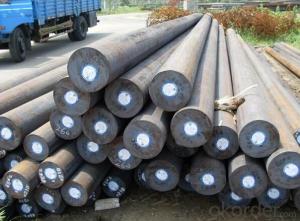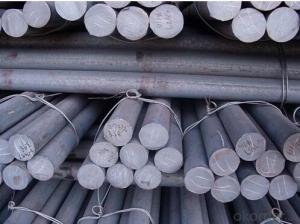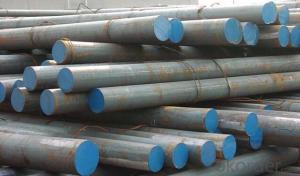Grade DIN34CrNiMo6(1.6582) Alloy Steel Round Bar
- Loading Port:
- Shanghai
- Payment Terms:
- TT OR LC
- Min Order Qty:
- 30 m.t
- Supply Capability:
- 10000 m.t/month
OKorder Service Pledge
OKorder Financial Service
You Might Also Like
Item specifice
Specifications of Round Bar
1. Alloy steel round bar
2. Dia:16mm~250mm
3. Length: 6m, 9m, 12m or as customer’s request
4. Tolerance: Within ±5% for weight; ±2mm for diameter
5. Note: The price can be better is the quantity is good
6. Equivement Grade:
DIN:34CRNIMO6
SAE:4340
JIS:SNCM439(SNCM8)
BS:817M40
UNI:40NiCrMo7
2. Chemical Composition
| C | Si | Mn | S | P | Cr | Ni | Cu | Mo |
| 0.37-0.44 | 0.17-0.37 | 0.50-0.80 | ≤0.025 | ≤0.025 | 0.60-0.90 | 1.25-1.65 | ≤0.025 | 0.15-0.25 |
Mechanical Property
Tensile Strength: σb (MPa):≥980(100)
Yeild Strength: σs (MPa):≥835(85)
Elongation: δ5 (%):≥12
Impact Force: Akv (J):≥78
Usage and Applications of Round Bar
1. Chinese standard steel bar is often used where large amounts of steel need to be formed, for example as structural steel.
2. And we can use this kind of product on the performance of the mechanical parts if the demand is not very high.
3. Steel round bar is used in construction and a large number of architectural and engineering structures.
Packaging & Delivery of Round Bar
Packaging Detail: All goods are packed in bundle with steel strips and shipped by break bulk vessel or container (depend on target market and different ports)
Delivery Detail: 15~45 days
Trade terms: FOB, CFR, CIF
MOQ: 30 metric tons per specification; we can negotiate the quantity if the specification is normal or we have stock of one specification.
Weight: Theprice invoicing on theoretical weight basis or actual weight basis depends on customer’s request.
Shipment: The shipment of bulk break or container is depends on customer’s request and the situation of the port of destination.
Documents given: Full set of original clean on board bill of lading; Original signed commercial invoice; Original packing list; Policy of insurance; Certificate of origin and what the target market needs.
Production Flow of Round Bar
1. The common processes are preheated forging quenching, dual refinement solution process, cooling quenching and isothermal quenching. We use heat treatment for dual refinement solution process.
2. Material prepare (billet) — heat up — rough rolling — precision rolling — cooling — packing — storage and transportation
FAQ:
Q1: Why buy Materials & Equipment from OKorder.com?
A1: All products offered byOKorder.com are carefully selected from China's most reliable manufacturing enterprises. Through its ISO certifications, OKorder.com adheres to the highest standards and a commitment to supply chain safety and customer satisfaction.
Q2: How do we guarantee the quality of our products?
A2: We have established an advanced quality management system which conducts strict quality tests at every step, from raw materials to the final product. At the same time, we provide extensive follow-up service assurances as required.
Q3: How soon can we receive the product after purchase?
A3: Within three days of placing an order, we will begin production. The specific shipping date is dependent upon international and government factors, but is typically 7 to 10 workdays.
Q4: What makes stainless steel stainless?
A4: Stainless steel must contain at least 10.5 % chromium. It is this element that reacts with the oxygen in the air to form a complex chrome-oxide surface layer that is invisible but strong enough to prevent further oxygen from "staining" (rusting) the surface. Higher levels of chromium and the addition of other alloying elements such as nickel and molybdenum enhance this surface layer and improve the corrosion resistance of the stainless material.
Q5: Can stainless steel rust?
A5: Stainless does not "rust" as you think of regular steel rusting with a red oxide on the surface that flakes off. If you see red rust it is probably due to some iron particles that have contaminated the surface of the stainless steel and it is these iron particles that are rusting. Look at the source of the rusting and see if you can remove it from the surface.
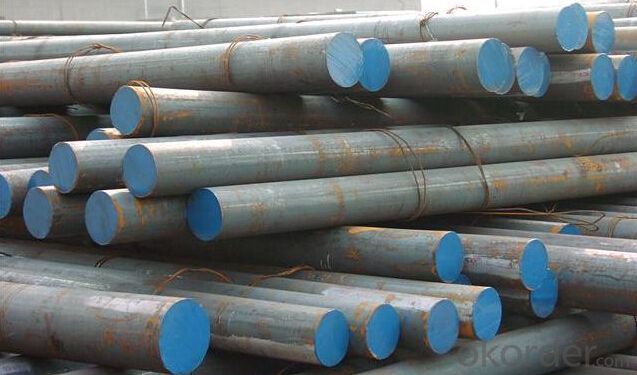
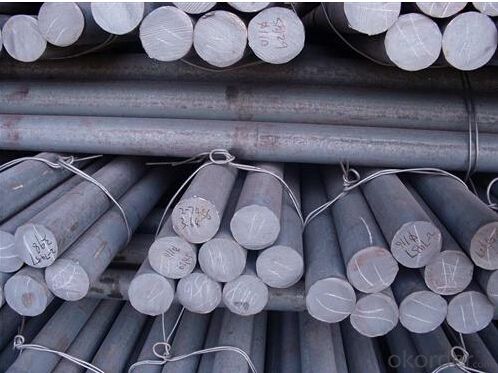
- Q:What are the challenges in machining special steel?
- Machining special steel can present several challenges due to its unique properties. One of the main challenges is its high hardness, which requires specialized cutting tools and techniques to effectively shape the steel. Another challenge is the tendency of special steel to work harden, making it more difficult to machine as the process progresses. Additionally, special steel often contains alloying elements that can cause increased tool wear and heat generation during machining, necessitating careful selection of cutting parameters to maintain tool life and prevent thermal damage. Finally, the inherent toughness of special steel can also pose challenges in terms of chip formation and control, as well as potential tool breakage. Overall, machining special steel demands expertise, precision, and appropriate tooling to overcome these challenges and achieve desired results.
- Q:How are tool steels used in the manufacturing of cutting tools?
- Tool steels are used in the manufacturing of cutting tools due to their excellent hardness, toughness, and wear resistance. These steels are specifically designed to withstand high temperatures, pressures, and repeated impacts during cutting operations. They are used to make various cutting tools like drills, milling cutters, saws, and blades. The high hardness of tool steels allows them to retain their sharpness for longer periods, ensuring efficient cutting performance. Additionally, their toughness helps withstand the mechanical stresses encountered during cutting, while their wear resistance enables them to maintain their cutting edges even after prolonged use. Overall, tool steels are crucial in the manufacturing of cutting tools, enabling precise and efficient material removal processes in various industries.
- Q:Can special steel be coated?
- Yes, special steel can be coated. Coating special steel provides several benefits such as corrosion resistance, improved aesthetics, increased durability, and enhanced functionality. There are various coating materials and techniques available for special steel, including but not limited to electroplating, hot-dip galvanizing, powder coating, and ceramic coating. These coatings help protect the steel from environmental factors, chemical exposure, and wear and tear, thereby extending its lifespan and maintaining its performance. Additionally, coatings can also be customized to provide specific properties like non-stick surfaces, heat resistance, or anti-microbial properties, depending on the intended application of the special steel.
- Q:What are the common quality control measures for special steel?
- Special steel undergoes various quality control measures to ensure its compliance with desired properties and specifications. These measures are as follows: 1. To ensure the required chemical compositions, chemical composition analysis techniques, such as spectrometry, are employed. 2. Mechanical testing, including tensile testing, hardness testing, impact testing, and fatigue testing, is conducted to verify the steel's mechanical properties, such as strength, hardness, toughness, and ductility. 3. Non-destructive testing methods, like ultrasonic testing, magnetic particle testing, and dye penetrant testing, are utilized to detect any internal or surface defects in the steel, ensuring its integrity and reliability. 4. Precise dimensional inspection is carried out to measure critical dimensions, such as length, width, thickness, and diameter, in accordance with customer requirements or industry standards. 5. Surface quality inspection ensures that the steel meets the required surface quality standards by examining it for defects such as cracks, pits, scratches, or unevenness. 6. The effectiveness of the heat treatment process, which includes annealing, quenching, or tempering, is verified through hardness testing or microstructure analysis. 7. Comprehensive documentation and traceability records are maintained to ensure quality consistency and provide a reference for future use or troubleshooting. These records include details of the production process, chemical composition, mechanical properties, and any inspections or tests performed. By implementing these quality control measures, manufacturers can guarantee that special steel meets the required specifications, offering customers high-quality and dependable products for their specific applications.
- Q:How does special steel perform in high-temperature strength?
- Special steel performs well in high-temperature strength due to its unique composition and properties. It is specifically designed to withstand and maintain its mechanical strength and structural integrity at elevated temperatures. This is achieved through the careful selection of alloying elements, heat treatment processes, and precise control of microstructure. Special steel exhibits excellent resistance to deformation, creep, and oxidation, making it a preferred choice for applications that involve high temperatures, such as in power generation, aerospace, and industrial processing.
- Q:How is case-hardening steel used in the production of gears and shafts?
- Case-hardening steel is used in the production of gears and shafts to enhance their surface hardness and wear resistance. By subjecting the steel to a specialized heat treatment process, such as carburizing, the outer layer of the metal becomes hardened, while the core remains tough and durable. This case-hardening process ensures that the gears and shafts can withstand the high stresses and loads they experience during operation, resulting in improved performance and longevity.
- Q:Can special steel be used in the wind turbine manufacturing industry?
- Yes, special steel can be used in the wind turbine manufacturing industry. Special steel, such as high-strength or corrosion-resistant alloys, is often used in the construction of wind turbine components due to its durability, strength, and resistance to harsh environmental conditions. These specialized steel alloys help ensure the longevity and performance of wind turbines in the renewable energy industry.
- Q:How does special steel contribute to the agricultural industry?
- Special steel plays a vital role in the agricultural industry by providing durable and high-performance components for various farming equipment and machinery. Its unique properties such as strength, toughness, and corrosion resistance make it ideal for withstanding the demanding conditions encountered in agricultural operations. One of the key applications of special steel in agriculture is in the manufacturing of tillage tools such as plows, harrows, and cultivators. These tools are subjected to intense forces and abrasion while breaking the soil, and special steel ensures that they remain sturdy and efficient over extended periods of use. The toughness and wear resistance of the steel help to reduce the need for frequent replacements, thereby improving the overall productivity and cost-effectiveness of agricultural activities. Additionally, special steel is extensively used in the production of harvesting machinery like combine harvesters, grain conveyors, and crop processing equipment. These machines require components that can withstand the continuous stress and impact of harvesting and processing operations. Special steel's exceptional strength and fatigue resistance enable these machines to handle heavy loads and endure prolonged usage without compromising performance or safety. Furthermore, special steel finds application in the construction of irrigation systems, storage tanks, and other infrastructure required for efficient water management in agriculture. The corrosion resistance and durability of special steel ensure that these structures can withstand the harsh conditions of moisture and chemicals present in agricultural environments, thereby ensuring their longevity and functionality. Overall, special steel contributes significantly to the agricultural industry by providing durable and reliable components for various farming equipment and infrastructure. Its properties enhance the efficiency, productivity, and longevity of agricultural machinery and structures, ultimately benefiting farmers and enhancing the overall sustainability of agricultural practices.
- Q:What are the different forging techniques used for special steel?
- There are several forging techniques used for special steel, including open die forging, closed die forging, and ring rolling. Open die forging involves shaping the steel between flat dies, allowing for flexibility in the size and shape of the final product. Closed die forging, on the other hand, uses shaped dies to shape the steel into a specific form. Ring rolling is a technique used to produce seamless rings by rolling a heated steel billet between two rotating rolls to achieve the desired shape. These techniques ensure the production of high-quality, customized special steel products for various applications.
- Q:What are the properties of corrosion-resistant alloy steel?
- Corrosion-resistant alloy steel possesses properties such as high resistance to corrosion, oxidation, and rusting, making it suitable for applications in aggressive environments. It exhibits excellent strength and durability, even in harsh conditions, while maintaining its corrosion resistance. Additionally, it can withstand high temperatures and pressures, making it ideal for industries like oil and gas, chemical processing, and marine applications.
1. Manufacturer Overview |
|
|---|---|
| Location | |
| Year Established | |
| Annual Output Value | |
| Main Markets | |
| Company Certifications | |
2. Manufacturer Certificates |
|
|---|---|
| a) Certification Name | |
| Range | |
| Reference | |
| Validity Period | |
3. Manufacturer Capability |
|
|---|---|
| a)Trade Capacity | |
| Nearest Port | |
| Export Percentage | |
| No.of Employees in Trade Department | |
| Language Spoken: | |
| b)Factory Information | |
| Factory Size: | |
| No. of Production Lines | |
| Contract Manufacturing | |
| Product Price Range | |
Send your message to us
Grade DIN34CrNiMo6(1.6582) Alloy Steel Round Bar
- Loading Port:
- Shanghai
- Payment Terms:
- TT OR LC
- Min Order Qty:
- 30 m.t
- Supply Capability:
- 10000 m.t/month
OKorder Service Pledge
OKorder Financial Service
Similar products
New products
Hot products
Related keywords


